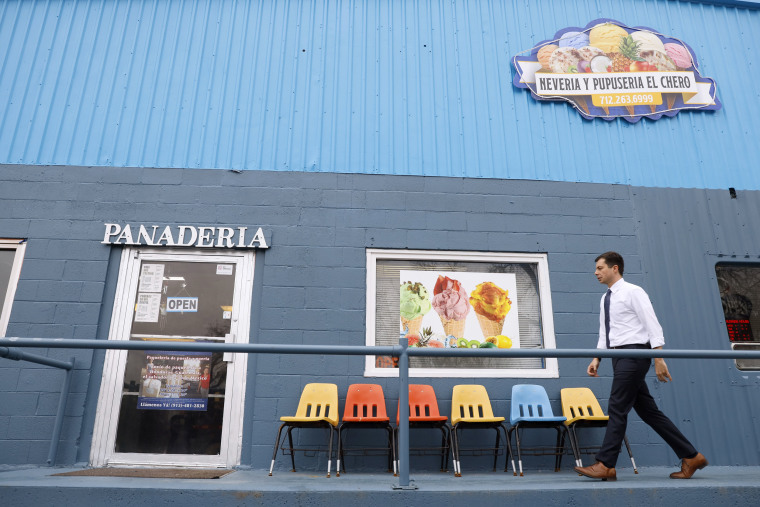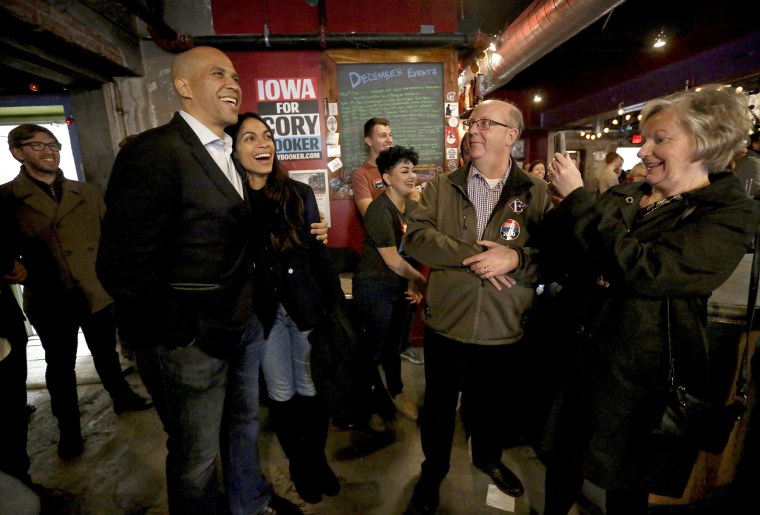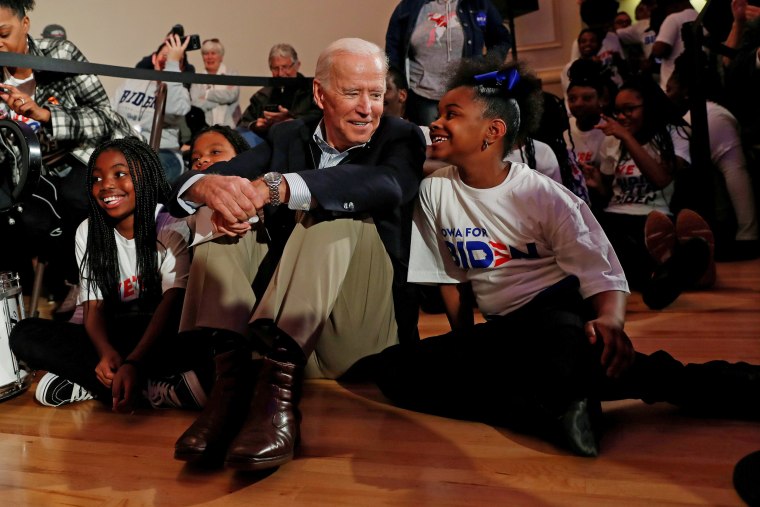WATERLOO, Iowa — Ryan Stevenson grew up in Waterloo, where about 15 percent of the population is black — the highest percentage of any city in Iowa — but as a kid, he doesn't remember seeing campaigns canvassing in his neighborhood, yard signs on neighbors' lawns or candidates coming to visit.
Stevenson, 32, considers himself lucky to have been inspired to become politically active, thanks to his grandmother, a Democratic deputy sheriff working in an office run by a Republican. After a stint in prison for drugs, Stevenson was drawn to field organizing and now works for the campaign of Sen. Cory Booker, D-N.J.
"I'm working in politics because I want people who look like me and who have experienced what I've experienced to know that there are people in this system who want to help them," Stevenson, who is black, said.
"A lot of stuff that we face all the time here like discrimination or criminal justice is now getting blasted across the mainstream," he told NBC News. "So we're in a strong position to be activists for the things that directly affect us."
Iowa's status as first in the presidential selection process has been criticized because the state lacks diversity. It is more than 90 percent white, while the Hispanic or Latino population is 6.2 percent and the African American population is at 4 percent. According to U.S. Census Bureau figures, the Latino population has grown by 46 percent in the past 10 years, which is a faster rate than the state’s population as a whole, and the population of blacks has grown by slightly more than 46 percent since 2009.
Though these demographic groups of color aren't a significant portion of potential caucusgoers, their support could be key in a tight contest.

Campaigns are working to harness that potential, as local community organizations push to educate and increase engagement in communities of color. Iowa Democrats feel confident that overall turnout in 2020 will top the 2016 participation, in which according to entrance polls, 3 percent of participating caucusgoers were African American and 4 percent were Hispanic.
South Bend, Indiana, Mayor Pete Buttigieg, who’s currently leading in Iowa specific polls, has been participating in meetings and calls with black leaders across the state and the campaign has national black and Latino engagement directors who visit Iowa to meet with community leaders. Buttigieg’s campaign also employs organizers who speak Spanish in Latino communities in the Hawkeye State.
Former Vice President Joe Biden's campaign brought on Ras Smith of Waterloo, the youngest African American state representative in Iowa, as its Iowa coalitions director.
"I'm really excited because there's been an emphasis that the campaign really build a strong, diverse base," Smith said. "It's important to have that to be a good reflection of our party as a whole. The generalization that minority voters all vote on the same issues typically does a disservice. We've been focused on building a diverse coalition but also understanding that within those different coalitions, there's diversity.”
Sen. Bernie Sanders, I-Vt., has worked to build connections in the Latino community by tapping the state director of the League of United Latin American Citizens, or LULAC, as one of his campaign's co-chairs and hiring bilingual organizers, in addition to prioritizing Muslim outreach.
Sen. Elizabeth Warren, D-Mass., hired staffers dedicated to targeting African American and Latino communities, hosting policy roundtables to work through how her many plans would benefit those communities specifically.
Before she quit the race, Sen. Kamala Harris, D-Calif., joined Booker with the largest outreach effort when it comes to turnout among communities of color. Booker's events, like Harris' earlier this year, drew consistently diverse supporters, where most campaign events usually skew older and white.
Booker has recently brought his girlfriend, actress Rosario Dawson, on the trail with him — where she often speaks Spanish with supporters.

Daniella Fox, a black woman from Des Moines, has never caucused before, but she found herself at a community center in Ankeny just before Thanksgiving to listen to Warren make her pitch for the presidency.
"I'm just here to ask questions, to try to retain it and understand (the process). To be completely honest, the only reason why I'm being put into this universe is because of her,” she said pointing not to the senator, but one of the only other black women at the event: her friend, Deshara Bohanna, also of Ankeny.
"We (black voters and white voters) have different things to focus on culturally and that creates a gap as it relates to political involvement sometimes," Bohanna said. "But, you know, the learning curve is turning, and we're all becoming more active because we have to be. We can't afford not to be."
Wayne Ford, the co-chair of the Brown & Black Forums for presidential candidates and the longest-serving African American state legislator in Iowa's history, believes that the diverse pockets of the state face similar challenges as diverse neighborhoods across the country. This in his eyes makes Iowa a good starting point to assess the potential success of presidential candidates.
"Don't underestimate that Iowa is the fifth whitest state; we have the same challenges and the same dreams as other markets," he said. "Black and Latino communities in Iowa have the same problems here as in El Paso or Washington, D.C. We make sure the presidential candidates know about our issues and they know about who we are. Do we make a difference? Yes, we do!"
Ford pointed to a list of diverse elected officials around the state: "The mayor from Waterloo? Black. The past mayor from Des Moines? Black. The mayor in Clinton? Black. The school board members; we could go on and on about elected officials."
"I know that the spirit is in the air to participate (in the black community)," said Deidre DeJear, the first black candidate to win a primary nomination when she ran for Iowa secretary of state in 2018, and most recently Harris' Iowa campaign chair. "The enthusiasm is definitely in the air. What's not in the air is that people are decided (about which candidate to support). So it's important to go to those places where people intimately learn about things, so people feel comfortable when it's time to participate in the caucus process."
DeJear echoed what several leaders in communities of color said in interviews: to connect with potential caucusgoers, campaigns need to meet voters where they are — at barbershops, beauty shops, churches, small businesses and neighborhood meetings.
Urban Dreams, an organization that works with the "underserved and underrepresented populations" in Iowa, has been doing just that. A number of candidates have participated in the block party-style events hosted by the group in North Des Moines in an effort to connect with the local black community directly in their neighborhoods.
"One of the things we've been focused on is civic engagement at all levels," Izaah Knox, the executive director of Urban Dreams, said. "To be engaged and know what's happening but also the need to make people in the community feel important by actually having the decision makers come to our community."
Local leaders cautioned that voting and participation are an ongoing struggle for many disadvantaged communities, which is why Urban Dreams is partnering with the NAACP and Creative Visions, a Des Moines-based nonprofit working with low-income minority communities, to plan a "Restore Your Rights" and voter registration day aimed restoring voting rights for those who have been in prison.
"They've been sold this dream that their vote doesn't count, that their vote doesn't matter — because at one point it didn't," DeJear said of minority voters. "And that is something that has historically lived long within our community. So you just have to continuously give them touches."
Looking back at past presidential runs, Ford credits Jimmy Carter and Barack Obama for inspiring the current crop of presidential candidates to pursue minority outreach in the state.
"Jimmy Carter was working the 'hood, Barack Obama was working the 'hood to get the support of the black community," he said. "As people started to recognize that the challenges and racism are shared experiences in communities across the country, black and white candidates make sure this is what they do. Whether it's Kamala Harris, Cory Booker or Pete Buttigieg, they make sure they go to the barbershop, the black churches. That tradition didn't start now, Jimmy Carter started that tradition."
Back in Waterloo, Stevenson continues to knock on doors to inspire neighbors to spread the word about Booker’s campaign, instilling what he calls "a sense of security" in learning about the caucus process among neighbors.
"I just feel like this is a way to empower my community," he said, "to bring forth the changes that we want and that we need."
